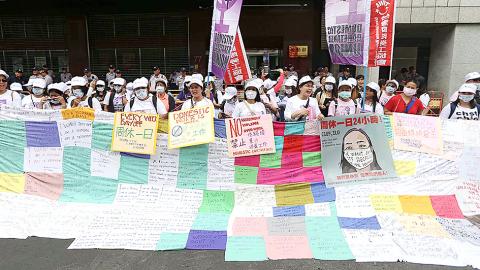Dozens of migrant workers employed as caregivers rallied in front of the Ministry of Labor in Taipei yesterday morning, calling on the ministry to protect their right to have one day off — 24 consecutive hours — every seven days.
“I want days off, because I am a human being,” the crowd, mostly dressed in white, chanted during the rally organized by the Taoyuan Domestic Caretakers Union.
They held up a large, colorful “petition patchwork quilt” made by caretakers who do not get days off, with slogans written in English.

Photo: CNA
Filipina Aileen said she had worked in Taiwan for six years, but for the first three years her then-employer did not give her one day off, while many foreign caregivers are asked to work all day, every day of the year.
The association said there are about 230,000 foreign caregivers in Taiwan, and more than 60 percent have no days off.
Asking for days off is not asking for additional rights, because days off are included in the employment contracts signed by the caregivers and their employers, so the ministry should protect the caregivers’ rights and tell employers to adhere to the contracts, association chairperson Huang Tzu-hua (黃姿華) said.

Photo: CNA
Overtime pay for foreign caregivers is NT$567 per day, which many employers regard as a minimal cost, so many of them would rather pay additional money instead of letting workers have a day off, Huang said.
Caregivers should receive one day off per week, and that day should be considered a full 24 hours, during which time a worker should not have to stay at their employer’s home, Huang said.
The government should provide respite care subsidies for employers who have to hire a temporary caregiver on their regular caregiver’s days off, because existing long-term care policies currently do not allow for such financial assistance, the association said.
This means that many employers cannot afford to let workers take days off, or take trips home to see their own families, it said.
Among those supporting the foreign caregivers at the rally was Nan Kuang-yuan (南光遠), who employs a foreign caregiver.
Foreign caregivers often cannot speak for themselves because they are not citizens, so he and the association hope the government can raise public awareness to let employers know the caregivers’ right to one day off per week, as regulated by their employment contract, he said.
The ministry issued a press release at noon, saying that employment contracts for foreign caregivers are required to include one day off every seven days, so the ministry urges employers to abide by such contracts.
The labor ministry is working with the Ministry of Health and Welfare to include respite care subsidies for families with foreign caregivers, but caregivers whose rights are being infringed can call the government’s 1955 foreign workers’ consultation and appeal hotline for help, the statement said.

South Korean K-pop girl group Blackpink are to make Kaohsiung the first stop on their Asia tour when they perform at Kaohsiung National Stadium on Oct. 18 and 19, the event organizer said yesterday. The upcoming performances will also make Blackpink the first girl group ever to perform twice at the stadium. It will be the group’s third visit to Taiwan to stage a concert. The last time Blackpink held a concert in the city was in March 2023. Their first concert in Taiwan was on March 3, 2019, at NTSU Arena (Linkou Arena). The group’s 2022-2023 “Born Pink” tour set a

CPBL players, cheerleaders and officials pose at a news conference in Taipei yesterday announcing the upcoming All-Star Game. This year’s CPBL All-Star Weekend is to be held at the Taipei Dome on July 19 and 20.

The Taiwan High Court yesterday upheld a lower court’s decision that ruled in favor of former president Tsai Ing-wen (蔡英文) regarding the legitimacy of her doctoral degree. The issue surrounding Tsai’s academic credentials was raised by former political talk show host Dennis Peng (彭文正) in a Facebook post in June 2019, when Tsai was seeking re-election. Peng has repeatedly accused Tsai of never completing her doctoral dissertation to get a doctoral degree in law from the London School of Economics and Political Science (LSE) in 1984. He subsequently filed a declaratory action charging that

The Hualien Branch of the High Court today sentenced the main suspect in the 2021 fatal derailment of the Taroko Express to 12 years and six months in jail in the second trial of the suspect for his role in Taiwan’s deadliest train crash. Lee Yi-hsiang (李義祥), the driver of a crane truck that fell onto the tracks and which the the Taiwan Railways Administration's (TRA) train crashed into in an accident that killed 49 people and injured 200, was sentenced to seven years and 10 months in the first trial by the Hualien District Court in 2022. Hoa Van Hao, a